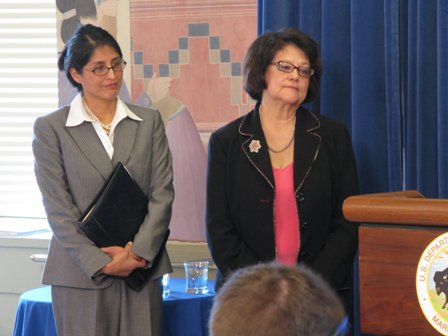 (CNN) -- Thousands of American Indians are now in line to receive part of a $3.4 billion settlement with the federal government, ending a long-running dispute over government mismanagement of tribal lands and accounts.
(CNN) -- Thousands of American Indians are now in line to receive part of a $3.4 billion settlement with the federal government, ending a long-running dispute over government mismanagement of tribal lands and accounts.
After an initial agreement was outlined in 2009, Congress approved it in November 2010 and it spent the last two years going through an appeals process. It was finalized Saturday, with government officials announcing and touting it on Monday.
"I welcome the final approval of the Cobell settlement agreement, clearing the way for reconciliation between the trust beneficiaries and the federal government," President Barack Obama said in a statement. The settlement is named after the late Elouise Cobell, a member of Montana's Blackfeet Indian tribe.
The deal follows a class-action lawsuit, filed in 1996, which accused the U.S. Department of the Interior of failing to account for and provide revenue from a trust fund representing the value of Indian assets managed by the government.
The missing funds at the center of the class-action case involve what are called Individual Indian Money accounts, which are supposed to represent the property of individual Indians. The accounts are held by the United States as trustee.
The lawsuit had accused the government of failing to account for the money, failing to make proper payments, and converting tribal money for the government's own use.
In making the announcement Monday, Obama remembered Cobell for "her honorable work." In 2009, she said that many represented in the class-action lawsuit "subsist in the direst poverty," and that the settlement is "significantly less than the full amount to which the Indians are owed."
"It's not fair," Cobell said then of the long process to reach a settlement, but "in the future we may be treated more fairly."
The agreement calls for $1.5 billion to be distributed among those who were part of the lawsuit.
Another $1.9 billion will go into a "land consolidation program" that will allow people to sell fractions of land they own, which are slivers of once larger ancestral plots that have been divided and sub-divided over generations.
The group ownership of land by American Indians dates back more than 100 years, before American Indians were permitted to write wills. As a result, the government says many pieces of tribal lands are held by many owners -- possibly hundreds, if not thousands of people per parcel. Officials have said the project allows individual landowners to receive greater value for their share, while cutting administrative costs for the federal government, which manages the Indian land trust.
Interior Secretary Ken Salazar said he hopes the agreement helps the government and American Indians turn the page on the ordeal.
"With the settlement now final, we can put years of discord behind us and start a new chapter in our nation-to-nation relationship," he said.
™ & © 2012 Cable News Network, Inc., a Time Warner Company. All rights reserved.
- Home
- News
- Opinion
- Entertainment
- Classified
- About Us
 MLK Breakfast
MLK Breakfast- Community
- Foundation
- Obituaries
- Donate
11-05-2024 7:11 pm • PDX and SEA Weather














































































































































































































































































































